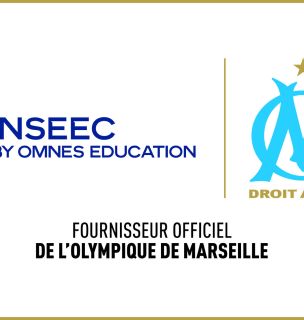An MSc to prepare for practice in a financial management company
Jean-Noël HAUSER
Directeur de programme
The MSc Corporate Finance & Financial Engineering course
The CFO is a true advisor to the General Management in the running of the company, to avoid pitfalls and optimize opportunities. Moreover, the financial function in a company is essential and has a double requirement today.
On the one hand, to ensure reliable and efficient financial services for the company in the areas of accounting, cash flow, the search for financing from banks and markets, as well as risk management. On the other hand, to be a constant partner of the General Management in the conduct of the company’s strategy by optimizing and securing its financial resources, in a world characterized by speed, complexity and interdependence.

A 1 or 2 year degree to become an expert in financial engineering
Les titulaires d’un BAC+ 3 peuvent candidater en MSc 1re année, les titulaires d’un BAC+4 directement en MSc 2ème année.
The students of this course will have to master all the fields of finance and treasury in order to make the right decisions concerning, on the one hand, the aspects of cash management, financing techniques and management of interest rate and exchange rate risks and, on the other hand, the setting up of LBO operations, venture capital, mergers-acquisitions and company transmissions. Students are recruited mainly in banks, consulting firms and in the financial departments of large companies.
How to apply to the MSc Corporate Finance & Financial Engineering at INSEEC?
The required prerequisites
The conditions for accessing the certification system (excluding VAE) are:
- For entry into the 1st year of the course (MSc 1): to have validated 180 ECTS (level 6, License or equivalent) in the field of marketing, commerce, management or communication. He must have a professional level of English for the English-speaking program.
- For entry into the 2nd year of the course (MSc 2): to have validated 240 ECTS (level 6, Master 1 or equivalent) in the field of marketing. He must have a professional level of English for the English-speaking program.
- Executive training is subject to specific prerequisites with professional experience taken into account.
Would you like to know more about the MSc in Corporate Finance & Financial Engineering ?
Sign up for an Open House!
Would you like to know more about the admission conditions for our programme in Corporate Finance & Financial Engineering ?
Courses
The courses presented below are given as an example, they may vary slightly depending on the teaching campus. The course content is adapted each year to market developments and updated before the start of each new school year.
1st year courses
PROFESSIONAL METHODS AND PRACTICES – 1ST YEAR
Business Game
The business game is played using a business simulator. Groups of students are responsible for running a business in real time. All major business functions are covered. Students will make decisions to maximize the profitability of the business.
Professional Technical Workshops and Personal Management
- CV writing, recruitment interview techniques for the search for an internship, professional project management, team management and meeting management.
- Negotiation techniques, transactional analysis and NLP, speaking and stage fright management, management and leadership techniques (PRADITUS).
- Skills assessment, coaching, digitization of the CV and job search techniques at national and international level, preparation for the defence of the applied research thesis.
Business Conferences
Presentation of the professions in the sector by professionals.
CROSS-CUTTING AND FUNDAMENTAL COURSES
Budget management and management charts
The objective is to acquire key skills in terms of budget management and reporting. The focus will be on budget architecture, with the implementation of summary documents, project management control and its link with budget management, and the creation and steering of performance indicators.
Business plan and setting up a company
The objective of this module is to learn how to draw up a business plan: Designing a costed project for the creation or development of a company.
Several steps are covered: feasibility study, market targeting, opportunities and risks, strengths and weaknesses, communication, financing plan and profitability.
Corporate Strategy
A precise methodology for analyzing customer needs, market structure and competitor dynamics to identify opportunities and threats in the environment is presented.
Negociation
This seminar focuses on a negotiation in a national and international context.
In particular, it will be necessary to take into account the cultural dimension and define its impact in an international negotiation. The national negotiation will focus on the sales process through role playing.
English
To perfect English language comprehension and communication skills in a wider context than just business English. Students are required to take the TOEIC test.
Management Information Systems
This module aims to deepen students’ skills in IT to meet the needs of companies in terms of budgetary or commercial monitoring, project management, personnel management and communication: Excel, Word, Powerpoint, teamwork tools, business software.
It aims to be efficient with office automation tools, identify and correct errors quickly, customize existing tools or create your own tools.
Business game
The business game is played using a business simulator. Groups of students are responsible for running a business in real time. All major business functions are covered. Students will make decisions to maximize the profitability of the business.
Business Skills
What makes a successful business person?
Internal and external communication skill; managing your priorities and deadlines; organization and time management skills; how to be a great listener, writer and speaker; effective sales techniques; effective group dynamics and project management skills; understanding international business culture.
SPECIALIZED COURSES
Fundamentals of accounting
The knowledge acquired during this module will enable you to master the accounting system as well as the elements that make up the balance sheet and the income statement. The key concepts are the formation of the result, the fixed assets, the current operations (VAT), the reductions, the personnel expenses, the stocks or the loans. The course will be based on case studies to facilitate understanding through a mixed theory and practice approach.
Management control and business steering
The objective of this course is to know how to apply the fundamentals of management control in a professional context of activity management. The teaching will be based on practical cases of company creation in various structures (bank agency, profit center). A focus will be made on the implementation of performance management tools through management control. Students will be able to create and interpret a dashboard, financial indicators and understand strategic decision-making based on reporting tools.
Audit and statutory auditors
The objective of this module is to make learners aware of the importance of the opinion and the public interest mission of the auditors. The focus will be on the differentiation between internal control and internal audit. The learner will be able to complete a risk table from audit tests, understand the concept of materiality, measure the importance of evidence in conclusions, and distinguish between management and auditor responsibility. The module will favour an approach based on case studies, in particular by studying the diagnosis of risks (case of expense accounts).
In-depth accounting
The course covers a presentation of the accounting logic and its regulatory framework. It is structured around the main cycles of operations that affect the life of a company: incorporation, acquisition of assets and the creation of liabilities. At the end of this module, the learner will be able to understand the accounting entries related to the main events affecting the life of the company and interpret the accounting statements produced by the company.
Financial Analysis
The final objective of this module is to introduce learners to the financial analysis of a company. The financial analysis will focus on the analysis of the activity (control of the intermediate balance of management (SIG), of the self-financing capacity (CAF)). But also in the analysis of the financial structure (top balance sheet operations, operations, cash flow, complements).
International financial statements
The objective is to understand the different types of management in order to manage one’s team efficiently. The management takes into account the management of commercial objectives while guaranteeing the motivation of the team and promoting cohesion. The identification of conflict risks within the team through an approach that takes into consideration the types of profiles and expectations of the collaborators is addressed in this module. This course integrates various positive management scenarios and emphasizes the notion of leadership in comparison to that of management.
Business Law
Definition of business law. The concept of contract. The different types of obligation: obligation of means and obligation of result. The concept of legal personality, the functioning of the SARL, the SA and the SNC. Criteria for choosing a business form. The role and powers of the control and management bodies. The principles and the fields of application of the tax, the tax optimization in a group. International taxation. VAT: principles and mechanisms. Special VAT regimes. The territoriality of VAT: the rules of the territoriality of VAT, the deliveries of movable goods, the supply of services. The VAT due: the VAT base and its calculation.
Corporate Finance
The objective of the course is to allow the student to acquire the first reflexes of a financial analysis by having a global vision of the company through the study and the analysis of the main existing financial documents (balance sheet and income statement). This work will be based on the analysis of the internal legal structure and its impact on the evolution of the company. Emphasis will also be placed on the ability to determine the profitability of an investment and on techniques for valuing a company.
Market Finance
The objective of this module is to better understand the organization and functioning of the different segments of the capital markets as well as the characteristics and functioning of the main financial assets issued and traded on the markets. It is also about knowing how to manage a portfolio of fictitious financial assets. Here are the points that will be studied in class: the organization of the markets (typology, actors, regulatory authorities), the debt markets (money market, bond market), the equity markets (characteristics and typology of equities, operation, management of an equity portfolio), and the derivative markets (futures, options, swaps).
Company Taxation
The objective of the course is to know how to master the tax regulation by discovering the functioning of the main taxes and duties concerning companies. Concepts such as income tax, registration fees, real estate wealth tax, corporate tax and VAT will be covered during this module. At the end of the course, the learner should be able to calculate the various taxes and duties affecting companies.
2nd year courses
PROFESSIONAL METHODS AND PRACTICES- 2ND YEAR
Professional technical workshops and personal management
CV writing, recruitment interview techniques for the search for an internship, professional project management, team management and meeting management.
Negotiation techniques, transactional analysis and NLP, speaking and stage fright management, management and leadership techniques (PRADITUS)
Skills assessment, coaching, digitization of the CV and job search techniques at national and international level, preparation for the defence of the applied research thesis.
LinkedIn workshops.
Financial engineering division
Setting up a merger and acquisition
The objective of this course is to master the main mechanisms of Mergers & Acquisitions (M&A) operations by explaining the main steps of these operations. Learners will be led to appropriate the terms used in practice (SPA, GAP, NDA, LOI, closing, signing, etc.) but also to understand the documents established by the main protagonists of this type of operation. All the steps of an M&A transaction will be detailed, whether it is the pre-contractual phase or the negotiation phase (conditions precedent, asset and liability guarantees, deed of reiteration, etc.). A focus will also be placed on the other forms of M&A transactions (merger, partial contribution of assets, spin-off).
Business valuation and sale
This course will present the main methods of business valuation: asset-based method, mixed method (CPNE and discounted goodwill), analogical method, discounted free cash flow method. At the end of the course, the learner must be able, according to the circumstances of the company studied, to criticize the various possible methods of evaluation in order to implement the most relevant one. The particular case of the evaluation of a startup will be discussed.
Structured finance and LBOs
The aim of this course is to introduce students to a case of financial engineering through an LBO set-up involving cross-disciplinary skills (financial, legal and tax). The LBO, Leveraged Buy-Out, is an acquisition financing by debt. At the end of this module, students should be able to master the constitution of a 5-year financial business plan in order to carry out an LBO via a holding company by proposing financing and validating it by calculating the financial covenants. The challenge is to understand the role of financial engineering in the strategic operations of companies.
Venture capital and valuation of innovative companies
In addition to the environment of start-up financing in France, and its actors, the module will focus on the issues and problems of valuation specific to innovative companies. Participants will learn about the specificities of venture capital (actors, intervention mode, context) compared to private equity (LBO, transmission) within the start-up financing ecosystem as well as the specificities of the valuation of “early stage” companies. A focus will be made on the integration of an equity investor through the business plan.
Transferring a business
This module provides the necessary elements for learners to understand the transmission market and the different types of possible transmissions. This module also addresses the consequences and tax issues of these operations for both the seller and the buyer while taking into account the legal, tax, financial and social constraints of a business transfer. The students will therefore be able to identify the main issues in the context of a transfer (business, transfer of shares, business in difficulty) but also to know the main components of family transfers and the main phases of the transfer.
Taxation of financial engineering
This course allows the understanding of the tax stakes but also of the legal operations carried out by the companies in order to build adapted schemes by approaching the regime of the capital gains or the passage of the accounting result to the tax result. In order to achieve these objectives, learners will develop new knowledge and skills that will enable them to master the concepts of tax engineering as well as to understand the taxation of financial engineering schemes. A focus will be made on the impact of the legal form of the company on the taxation of its results
Accounting optimisation mechanisms
Accounting practices are subject to regular observation, justified by the importance of the financial information published by companies. The objective of the course is to identify the main families of accounting rules and options accepted by the French accounting standard-setter, offering greater latitude to optimize the preparation of annual accounts. At the end of this course, the student should be able to use the main accounting rules and methods to optimize accounting information.
Investment banking division
Bank-company relations and financing techniques
In this course, participants will study how to understand a company’s financial structure and analyze its working capital requirements. The latter is an indicator that makes it possible to evaluate the financing needs of a company by taking into consideration the gap between current assets and liabilities. On this basis, students will be able to make the link between a company’s working capital and the various short-term financing solutions, but also to make the link between a financing plan and the various medium- and long-term bank loans (form, duration, guarantee, etc.).
Banking management and strategies
Banking institutions are subject to significant regulatory constraints. The students will learn about KYC, which is a set of regulations requiring banking institutions to collect information on their customers in order to identify possible fraudulent transactions (LCB-FT, Basel III, MIF, etc.). The module will introduce the new Regtech players whose objective is to provide banks with the tools to efficiently manage the current regulations. Finally, part of the course will be devoted to the collection of information related to customer ratings imposed on banking institutions, its objectives and risks.
Financing law
The legal aspect of the jobs of business managers and bank account managers will be at the heart of this teaching. It will be apprehended via the regulations in force such as the Basel II ratings and the Banque de France rating. The latter makes it possible to assess a company’s ability to honor its financial commitments over a period of 1 to 3 years. The learner will be led to distinguish between the various securities, which are guarantees that allow a creditor to obtain payment of his claim in the event of the debtor’s default. The different amicable or judicial procedures and their consequences for the lender and the borrower will also be detailed in this module.
Cash pooling and risk hedging instruments
The objective of this course is to identify the various financing, cash flow investment and interest rate and exchange rate hedging instruments that can meet the cash flow needs of a given company. Learners will study techniques for building a cash flow forecast and investing cash surpluses.
The different techniques of financing/investing cash and the instruments of financial risk management (exchange, interest rates) will be presented.
Financing real estate transactions
In order to approach the financial aspect of real estate operations, the module will start with the presentation of the French real estate environment as well as the usefulness and actions of the main actors of the market (real estate developers, real estate agencies, notaries, experts, etc.). The module will continue with the acquisition of the mechanisms of financing real estate operations (nature, assembly, etc.) and techniques of real estate tax exemption. Thanks to the knowledge provided by this course, the student will be able to calculate the profitability of a real estate investment and to propose a financing package.
Financial Diagnosis Unit
Strategic and financial diagnosis
Mastering the financial diagnosis of companies as well as the measurement of value creation are essential elements of this training. At the end of this course, students should be able to write an analysis report on a company. Different topics will be covered during the sessions such as financial analysis (of the activity, assets, restatement, ratios), but also analysis of margins, investments and financing. Participants will learn how to measure profitability (capital employed, leverage) as well as how to measure value creation.
Financial analysis of the consolidated financial statements
The analysis of the consolidated financial statements allows for the diagnosis of the financial situation of a group based on the determination of its strengths and weaknesses: study of profitability, risks and quality of management. The module will address, in this perspective, the methodology of financial diagnosis of groups: analysis of risks and management quality. The learner will be able to determine the consolidation method and scope and the level of control. The mastery of IFRS standards within the financial statements will be particularly developed (balance sheet, income statement, cash flow statement, statement of changes in equity).
Financial audit
The financial audit aims, through the examination of the financial statements of a company, to verify the regularity and conformity of the accounts. It provides management with an overview of the financial situation and allows recommendations for strategic action to be made. The module will address auditing as an instrument of financial legitimacy and will detail the methodology and auditing techniques to be implemented. At the end of this module, the learner will be able to select and implement a financial audit technique in a timely and appropriate manner.
International accounting standards
This module is designed to familiarize participants with International Accounting Standards by giving them a first approach to US GAAP and IFRS (International Financial Reporting Standards). The objective of this course is the appropriation of the main differences between the Anglo-Saxon standards (US GAAPs and IFRSs) and the French standards as well as the identification of the scope of application (legal and conventional criteria) and the practical applications of these standards in the daily activity of French companies.
Projects, internships and career paths
Company project
Solving a company case or a professional application leading to a presentation in front of the company and the teaching team.
The course content is adapted each year and updated before the start of the new school year
2 start dates per year and varying study rhythms
There are two openings per year,in February/March and September/October. To check the opening of each intake, contact the admissions department directly.
The rhythm of the courses may differ depending on the campus and whether the training is carried out under an internship agreement (initial) or a professionalization/apprenticeship contract (continuing).
The work-study contract must be signed for a period of 12 months (MSc 2), 24 months (MSc1 + MSc 2) or 18 months for the staggered start of March (continuation of studies in MSc2).

Career opportunities after an MSc in Corporate Finance & Financial Engineering
- Internal auditor
- Financial auditor
- Management controller
- Business management consultant
What business skills are developed?
The objectives in terms of skills are to be able to:
- Analyze strategic company data
- Control and manage the company’s activity
- To ensure the sustainability of the company’s activity
- Making financial recommendations and mastering communication
This program delivers the title of ” Expert in Financial Analysis ” level 7 (EU) registered in the RNCP (National Directory of Professional Certifications) under the code NSF 313 and 314, awarded by INSEEC MSc (INSEEC EXECUTIVE EDUCATION, CEE-SO, CEE-RA, CEFAS, MBA INSTITUTE), registered under number 35007 in the RNCP (Répertoire National des Certifications Professionnelles) by decision of the Director General of France Compétences on 14 October 2020.
The certification is obtained by capitalisation of all the blocks of skills.
For more details, please consult the online repository: https://www.certificationprofessionnelle.fr/recherche/rncp/35007
Program available on the Paris, Bordeaux, Lyon and Chambéry campuses.
What are the teaching methods?
Teaching methods
- Lectures and interactive courses
- Situational exercises through collective or individual case studies carried out by the students
- Conferences, seminars and educational visits
Evaluation methods
- Individual or group case studies
- Individual and group oral presentations
- Individual and group files
Methods and tools
- The evaluation methods are face-to-face, in the form of continuous assessment or final exams in the form of mid-term exams.
What is the 2024/2025 tuition to enter the program?
Initial training:
- Entry MSc1 : 11 400 €
- Entry MSc2 : 12 950 €
Continuing education (sandwich course) :
- 24 months : 22 850 € HT
- MSc2 : 13 650 € HT
VAE/VAP :
- VAE : 4 200€ HT
- VAP : 850 € HT
International Student Pack: Mandatory fee of €490 for exclusive support services for international students.
What kind of financial aid is available?
INSEEC offers several financial aid schemes:
- The alternating rhythm, in internship or work-study contract
- The right to training via the CPF
- Partnerships with banking institutions referenced at INSEEC
Key figures for the RNCP "Expert in financial analysis"
97%
Presentation rate – Promo 2023
92%
National success rate – Promo 2023
86%
Overall integration rate (140 respondents out of 368)– Promo 2022
78%
Satisfaction rate after 6 months – Promo 2022
Disability
The OMNES Education Group pays particular attention to the societal environment, including the disability dimension. Indeed, we believe that students with disabilities should not have any problems in pursuing their studies and starting a professional career. We accompany them to facilitate their access to the premises, offer them personalized advice as well as adapted accommodations throughout their school career.
Accessibility of premises: all our campuses are accessible to people with disabilities.
To learn more about the OMNES Education Group’s disability policy, click here.
Contacts for disability referents by campus:
Bordeaux : Maxime DOUENS – mdouens@inseec.com
Lyon : Anissa GASMI – agasmi@inseec.com
Paris : Priscila SELVA – pselva@inseec.com
Rennes : Laura LE CALVEZ – llecalvez@omneseducation.com
Chambéry : Clément BERTACCO – cbertacco@inseec.com
Marseille : Océane VALOTTI : ovalotti@omneseducation.com
News

June 2024
INSEEC hosted the CFNews Grands Prix de la Croissance Externe Sud Ouest for the second year running
Read more




